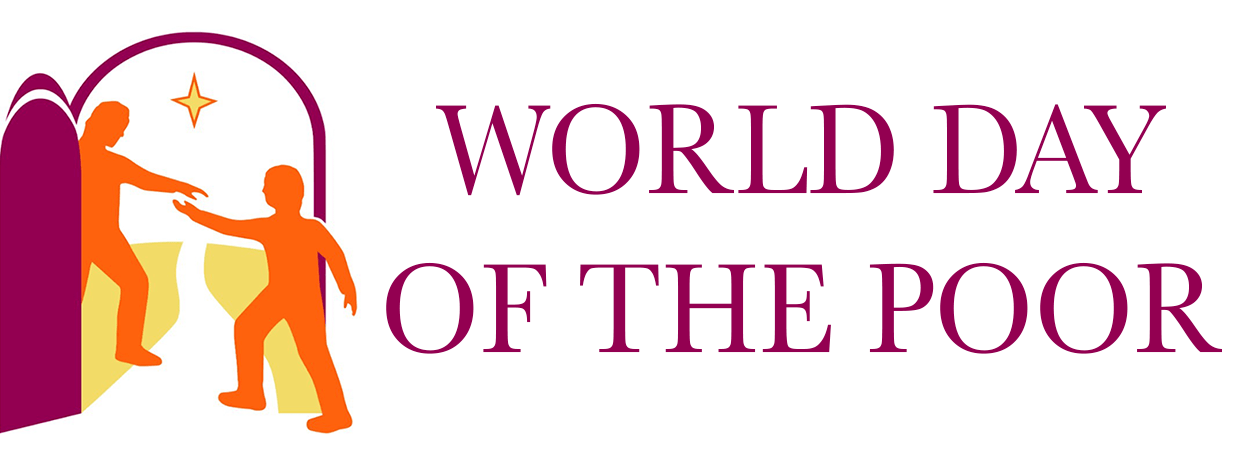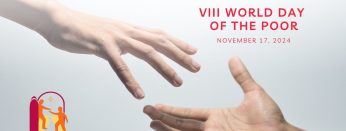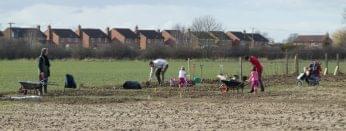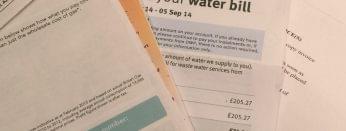Sunday 13 November 2022 is the sixth World Day of the Poor, with the theme of “For your sakes Christ became poor” (2 Cor 8:9). Pope Francis, in his message for the day, laments that just as the world was emerging from the “tempest of the pandemic”, a new catastrophe appeared on the horizon: the Russian invasion of Ukraine and the brutal war which has followed. The war has displaced millions of Ukrainian people and caused global economic turbulence, with food shortages and rising energy costs which will affect the poorest this winter. The Pope reminds us of the generosity of people in welcoming refugees from recent conflicts in the Middle East. He understands that host communities can feel burdened, and it is difficult to maintain relief efforts, but he says, “This is the moment for us not to lose heart but to renew our initial motivation. The work we have begun needs to be brought to completion with the same sense of responsibility.”
At Caritas Social Action Network, we have partnered with St John of God Hospitaller Services to create a Homes for Ukraine Matching Service. The careful selection process will allow displaced Ukrainian people – mostly women and children – to be matched with hosts in Britain who understand the expectations of the remarkable act of generosity of opening their homes and their hearts to a stranger. Once the match has been made, the guest can apply for a visa naming their host. We are acutely aware that for many people in our country, the cost-of-living crisis means that their focus is on their own survival and much of our charitable outreach will rightly concentrate on the needs of people at home facing the prospect of being dragged into poverty. There will be some, however, who will be less affected by the crisis and may have the capacity to consider welcoming a Ukrainian person displaced by war into their home. For more details of the matching service, please visit the website: https://sjog-homesforukraine.uk/.
In his message for the sixth World Day of the Poor, Pope Francis reminds us that from the very early days of the Church, attention to the needs of the poor was a feature of the community. St Paul, in his letter to the Christians in Corinth, is asking for help for the community in Jerusalem, who are suffering great hardship due to a food shortage in the country. He does not regard this request as a command but instead asks them to take up a collection as “a sign of love, the love shown by Jesus himself”. As Pope Francis reminds us, “where the poor are concerned, it is not talk that matters; what matter is rolling up our sleeves and putting faith into practice through a direct involvement, one that cannot be delegated”. It is important that no one lacks what is necessary and our concern is born out of sincere and generous concern which sees those who are poor as our brothers and sisters. It is not so much that we are helping them, but that they “lend a hand to help me shake off the lethargy into which I have fallen”. Before being the objects of our almsgiving, those who are poor “can help set us free from the snares of anxiety and superficiality”. That is why the Pope insists that our work is never for the poor, but with the poor and of the poor, work that brings people together (Fratelli Tutti, 169).
More than that, we are called to become poor ourselves. Not materially poor, that is “a poverty that humiliates and kills” as the Pope says. The poverty we are called to is the poverty of Jesus, this is the poverty that sets us free, sets us free from attachment to the idol of wealth and all the anxiety it brings. The poverty of Jesus was his self-emptying love, which excludes no one “and seeks out everyone, especially the marginalised and those deprived of the necessities of life. Our freedom is the sharing of our lives out of love, restoring dignity to those trapped in injustice. This is what the Holy Father calls the way to create equality, “to free the poor from their misery and the rich from their vanity, and both from their despair”.
The resources we have gathered here are offered to the Catholic community as a way of deepening our encounter with those who are poor, of examining our own conscience about our lifestyles and how our faith is expressed in loving action. In his message in 2017, the Pope asked Catholic communities in the week preceding the World Day of the Poor to engage in acts of encounter and concrete expressions of charity. The focus is not fundraising, but encounter, accompaniment and change. The See-Judge-Act exercise is designed primarily for group use in a parish or a school to discern what actions might be taken. Do we know our community, who do we ‘see’ there, who do we not see, what is the Holy Spirit prompting us to do?
The novena is offered as a way to help us to prayerfully encounter in scripture God’s constant care for those who are in various forms of poverty and to prompt in us a desire for more just relations in the community. The readings are not from the readings of the day, this is a separate devotional exercise. It can be said individually or in school or parish groups.
You will find more details of the diocesan Caritas agencies and independent charities that are members of Caritas Social Action Network on our website at www.csan.org.uk. These charities are engaged in different ways in tackling the causes of poverty, promoting justice and restoring dignity. You will find much inspiration from them for your own social action.





